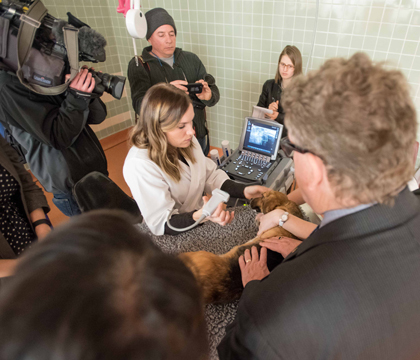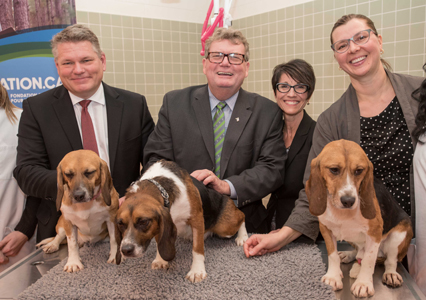
CFI invests in U of S projects
University of Saskatchewan researchers will share a total of $844,000 from the Canada Foundation for Innovation (CFI) for wide-ranging projects that will explore potential health benefits of using pulse crops in pet and fish feeds, energy-efficient technology for removing water from biofuels, catalysts to clean up air and water, and genetic and environmental factors underlying diseases such as cancer and osteoarthritis.
By U of S CommunicationsThe four projects were announced January 20 on the U of S campus by Ed Holder, Canada's Minister of State for Science and Technology, as part of a national announcement involving $35 million from the CFI's John R. Evans Leaders Fund for 37 universities across Canada.
"This major CFI investment will provide the tools and facilities to develop new knowledge that benefits the health of people, pets, and environment, and new technologies that add value to Canadian commodities such as our multi-billion-dollar pulse crops," said Karen Chad, U of S vice-president research.
"In the process, our talented researchers create training opportunities for the next generation of Canadian innovators."

The successful U of S research projects are:
Imaging cell functions that may underlie disease: Franco Vizeacoumar and Brian Eames (medicine) received $504,000 toward a $1.26-million, high-throughput molecular imaging platform to dissect the complex combinations of genetic and environmental factors that influence basic cell functions.
These functions go awry in diseases such as cancer, osteoarthritis and a range of other maladies. By identifying causal factors, this equipment can help in the development of novel therapeutics.
Developing healthier pet food alternatives: Lynn Weber and Jaswant Singh (Western College of Veterinary Medicine) received $172,000 toward a high-resolution ultrasound microscope to examine the effects of pulse crop-based diets on the cardiovascular and reproductive health of pets and fish.
Understanding how cells respond to a diet partially made of pulses such as chickpeas, beans and lentils will help the team develop nutritious pet food options to ensure the health and vitality of pets. The microscope will also be an essential tool for other studies such as using vitamin D and lentil hulls to protect against the effects of high-fat diets or tobacco smoke on humans.
Removing pollutants from air and water: Jafar Soltan (engineering) received $102,000 toward gas analysis and liquid chromatography systems for his Catalytic Ozonation Laboratory. The equipment will support his work in using ozone and catalysts to remove pollutants from air and water, particularly emerging pollutants such as pharmaceuticals from public water treatment facilities.
Removing water from biofuels: Catherine Niu (engineering) received $67,000 toward a biosorption system to remove water from biofuels (e.g. alcohol) and gaseous fuels (e.g. natural gas). Niu is looking at novel materials that soak up water based on canola meal, barley straw and other industrial byproducts with the goal of developing low-cost, high-efficiency fuel de-watering systems.
CFI provides up to 40 per cent funding for tools and infrastructure such as high-powered microscopes, advanced analytical instruments and specialized lab equipment, that help researchers generate breakthroughs, expand Canada's innovation capacity and contribute to the country's economic success. The remaining funding will be secured from government and industry sources.
"When the country's researchers have access to state-of-the-art tools and facilities, they can ask bold questions, find remarkable answers and apply them in new and, often, unexpected ways," said CFI President and CEO Gilles Patry.
"Their discoveries and innovations further Canada's reputation as a nation known for its research excellence."
